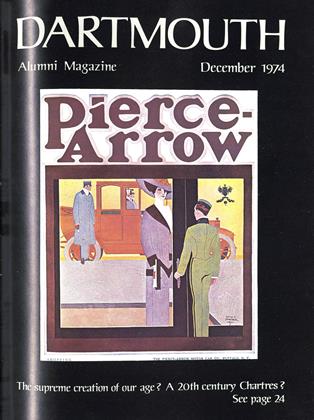Would you be willing to compare favorably Michael Moriarty '63 as a Shakespearean actor with Laurence Olivier? In a long rave review of Richard III in the October 22 New York Times, Clive Barnes would. He remarks that though Olivier has always looked on his interpretation of the "oddly attractive villain, a commonplace Lucifer reduced to a twisted human shape," as very much his own, not to be challenged, Moriarty, far from giving a pale imitation of Olivier gives a portrayal as if Olivier had never existed. "Mr. Moriarty gives a most subtle performance - what a Hamlet he is going to make ....!" Any person would be a fool, Barnes goes on, if, interested in the theater, he would miss Moriarty's Richard. Further praise is that Moriarty last year stirred more interest in his future than any other young American actor since Marlon Brando. "He comes to this Richard as a star, and is encouraged to play it as a star. As he seems to be by nature a Hamlet or a Richard 11, this casting of him as the amoral Richard Crookback is fascinating and in every way challenging." Moriarty's greatest moment comes when Shakespeare "peels off the conventional trappings of the Machiavellian villain and lets Richard, faced with his guilt, stand like a Macbeth before his destiny. His humanity is like an actor taking off his make-up, and his fears catch a trigger Olivier never looked to." Olivier would have envied the way Moriarty plays the death scene with a fantastical leap across the stage, a virtuoso gesture Olivier has always loved. A minor criticism: Moriarty "is sardonic when he should be evil, amused when he should be amusing, urbane when he should be cunning." In short, as a whole, the performance needs more authority and homogeneity.
Michael Moriarty '63 as Richard
 View Full Issue
View Full Issue
More From This Issue
-
 Feature
FeatureDartmouth De Gustibus: More Food for Thought
December 1974 By JOAN L. HIER -
 Feature
FeatureSheets of Sound
December 1974 By SID LEAVITT -
 Feature
FeatureChartres in a Chevrolet
December 1974 By ROBERT L. McGRATH -
 Feature
FeatureOur Crowd
December 1974 -
 Article
ArticleBig Green Teams
December 1974 -
 Class Notes
Class Notes1949
December 1974 By PAUL WOODBERRY, CHARLES S. KILNER







